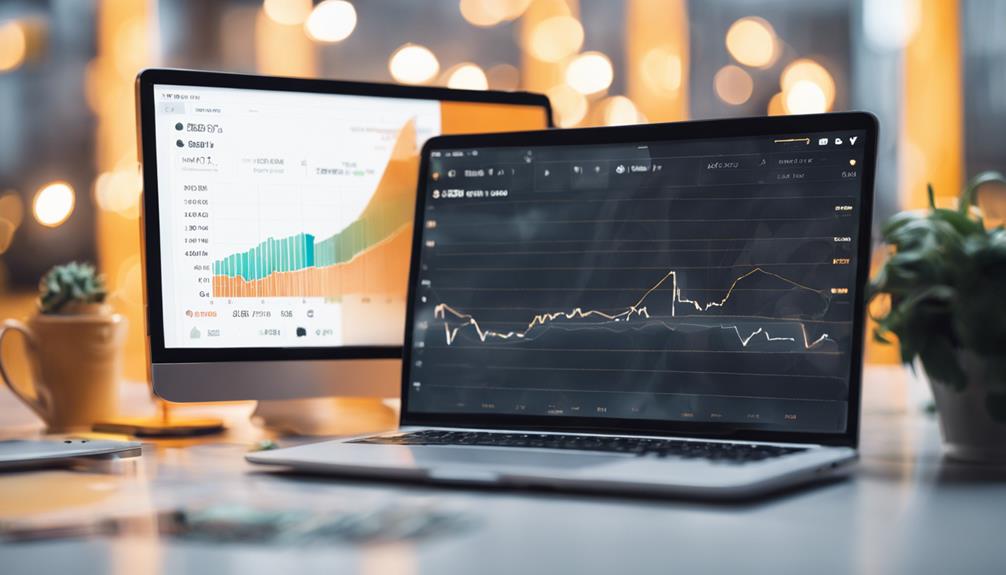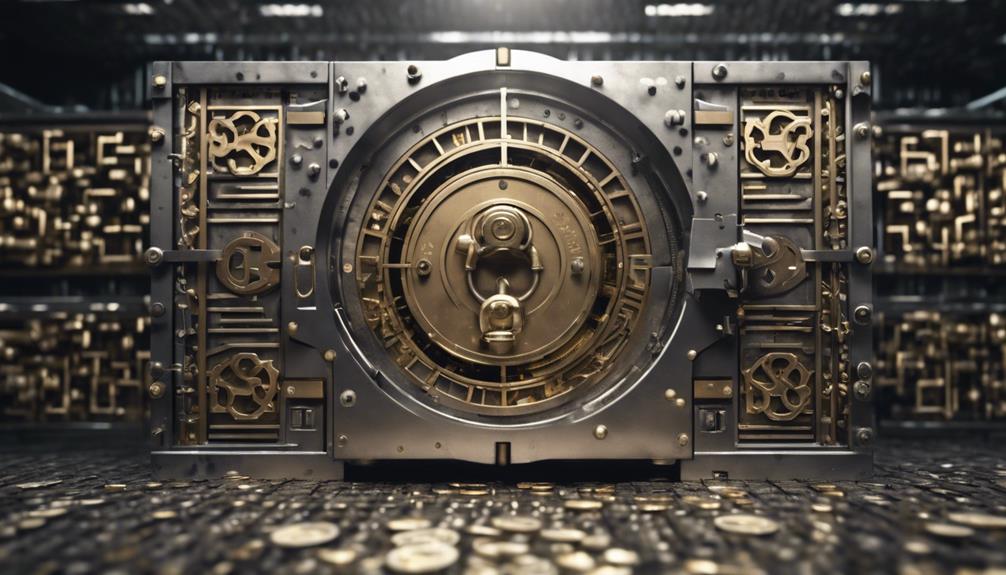When you are deciding on a Bitcoin IRA, make sure to consider these top 5 providers: Bitcoin IRA, BitIRA, iTrust Capital, Equity Trust, and Coin IRA. Bitcoin IRA provides a wide range of cryptocurrency options, $700 million insurance coverage, secure offline storage, and competitive rates. BitIRA, established in 2017, stores assets in nuclear bunkers and requires a minimum investment of $5,000. iTrust Capital, founded in 2018, offers 24/7 trading, low 1% transaction fees, and a user-friendly interface. Equity Trust, in operation since 1974, specializes in self-directed IRAs with no transaction fees but varying administrative costs. Coin IRA, established in 2017, provides competitive trading fees and secure cold storage. Explore the features of each provider in more detail.
Key Takeaways
- Bitcoin IRA offers trading in over 60 cryptocurrencies with $700 million insurance protection.
- BitIRA, established in 2017, provides extensive insurance coverage and stores assets offline in nuclear bunkers.
- iTrust Capital, founded in 2018, offers 24/7 trading, low minimum investment, and 1% transaction fees.
- Equity Trust, since 1974, specializes in self-directed IRAs with varying annual administration fees.
- Coin IRA, emerged in 2017, provides low fees, secure cold storage, and trading outside IRAs.
Bitcoin IRA

Bitcoin IRA, as an innovative investment platform, allows us to trade in over 60 types of cryptocurrency. With Bitcoin and crypto IRAs gaining popularity as retirement investment options, the security measures provided by Bitcoin IRA are paramount. The $700 million in insurance protection for digital assets offers peace of mind, ensuring that our investments are safeguarded against unforeseen circumstances. The secure offline storage further enhances the protection of our crypto assets, minimizing the risk of cyber threats.
When considering fees, Bitcoin IRA offers competitive rates, making it an attractive option for those looking to invest in digital assets for retirement. The account setup process is straightforward and efficient, simplifying the onboarding experience for investors. The customizable dashboard adds a layer of convenience, allowing us to tailor our investment strategy according to our preferences. Overall, Bitcoin IRA provides a user-friendly platform that prioritizes security and accessibility, making it a compelling choice for individuals seeking to diversify their retirement portfolio with cryptocurrency investments.
BitIRA

Shifting from our discussion on Bitcoin IRA, BitIRA, established in 2017, offers extensive insurance coverage for digital assets. They prioritize security by employing multi-encryption encoding for transactions and storing digital assets offline in nuclear bunkers.
With a minimum investment requirement of $5,000, BitIRA provides a secure platform for trading in cryptocurrencies. Their end-to-end insurance guarantees that your digital assets are protected, giving you peace of mind while investing in Bitcoin IRAs.
BitIRA's focus on secure storage in nuclear bunkers highlights their commitment to safeguarding your investments. By utilizing advanced encryption methods and secure storage facilities, BitIRA aims to provide a reliable and trustworthy platform for individuals seeking to invest in digital assets through IRAs.
Itrust Capital

Founded in 2018, iTrust Capital offers 24/7 trading for cryptocurrencies, making it a cost-effective option for investors. With a minimum investment of $1,000, users can access trading in 34 different digital currencies.
The platform stands out for its competitive rates, charging only 1% per transaction, which is appealing for those looking to diversify their portfolios. iTrust Capital provides a user-friendly experience, allowing individuals to manage their accounts efficiently. By enabling investors to trade digital assets at any time, it offers flexibility and convenience.
This feature is particularly advantageous in the fast-paced world of cryptocurrency trading. Additionally, the company's transparent fee structure ensures that investors can easily comprehend the costs involved. Overall, iTrust Capital presents a compelling option for individuals seeking to explore the world of cryptocurrencies within their retirement accounts.
Equity Trust

Established in 1974, Equity Trust specializes in managing self-directed IRAs, offering support for traditional and alternative investments within these accounts. With annual administration fees varying from $225 to $2,250 based on the account type, Equity Trust stands out among IRA providers by not charging transaction fees.
This allows individuals to explore a wide array of investment opportunities within their IRA accounts without incurring additional costs. The platform empowers investors to take control of their retirement investments, providing the freedom to choose from a diverse range of traditional and alternative investment options.
Whether you're looking to build a more traditional retirement portfolio or venture into alternative investments, Equity Trust offers the flexibility and support needed to tailor your IRA investments to align with your financial goals.
Coin IRA

Upon its inception in 2017, Coin IRA emerged as a pioneer in the domain of Bitcoin IRAs. As one of the early Bitcoin IRA companies, Coin IRA offers investors the ability to trade assets with low fees. The platform boasts a competitive trading fee structure, comprising a 1.25% buy fee and a 1% sell fee, making it an attractive option for those looking to invest in cryptocurrencies within their retirement accounts.
Beyond just Bitcoin, Coin IRA allows trading outside of IRAs and even facilitates the purchase of precious metals. Additionally, the platform provides secure cold storage for digital assets and features an experienced support team to assist users, ensuring a smooth investing experience.
With its user-friendly interface and automatic trading options, Coin IRA stands out as a reliable IRA provider for individuals seeking to diversify their retirement portfolios with cryptocurrencies and other alternative assets.
Frequently Asked Questions
Is Bitcoin IRA a Good Company?
Bitcoin IRA is a reliable company with a solid reputation. They offer a wide range of cryptocurrencies for trading and provide robust security measures, including insurance protection and offline storage.
The setup process is user-friendly, and their customizable dashboard makes accessing digital assets easy. Overall, Bitcoin IRA is a good choice for those looking to invest in cryptocurrencies with confidence and peace of mind.
Which IRA Is Best for Crypto?
We believe that iTrustCapital is the best IRA for investing in crypto due to its low $1,000 minimum investment and diverse selection of 34 cryptocurrencies.
With easy access and a variety of options, it offers a solid foundation for those looking to enter the crypto market through their IRA.
Coupled with strong security measures and insurance protection, iTrustCapital presents a compelling choice for crypto investors seeking growth and security in their retirement savings.
Does Bitcoin IRA Pay Interest?
Yes, Bitcoin IRA doesn't pay interest on the cryptocurrency holdings within the IRA. The focus is on providing a tax-advantaged way to invest in Bitcoin and other cryptocurrencies for retirement.
Instead of interest, investors can potentially benefit from capital appreciation of their cryptocurrency holdings. Bitcoin IRA aims to offer long-term growth through the value appreciation of digital assets.
It's essential for investors to consult with financial advisors to understand the risks and rewards of Bitcoin IRAs.
Can I Withdraw Bitcoin From Bitcoin Ira?
Yes, we can withdraw Bitcoin from a Bitcoin IRA, but it's essential to understand that most Bitcoin IRAs typically convert Bitcoin to cash or traditional assets for withdrawals.
This process allows access to your funds while maintaining the IRA's long-term investment focus. It's vital to grasp the tax implications of selling Bitcoin within the IRA and to consult with a tax advisor before initiating any withdrawals to guarantee compliance and maximize financial outcomes.
How Do the Top 5 Bitcoin IRAs Compare in Terms of Tax Benefits?
When evaluating bitcoin IRA tax implications, it’s crucial to compare the top 5 options in terms of tax benefits. Each company may offer different tax advantages, such as tax-free growth or tax-deductible contributions. By carefully weighing these factors, investors can maximize their tax benefits while investing in a bitcoin IRA.
Conclusion
After reviewing the top 5 bitcoin IRA options, it's clear that each has its own unique features and benefits. Whether you prefer Bitcoin IRA's user-friendly platform, BitIRA's security measures, Itrust Capital's low fees, Equity Trust's wide range of investment options, or Coin IRA's customer service, there's a choice for every investor.
Ultimately, the decision comes down to personal preferences and financial goals. So do your research, weigh your options, and choose the best bitcoin IRA that fits your needs.











